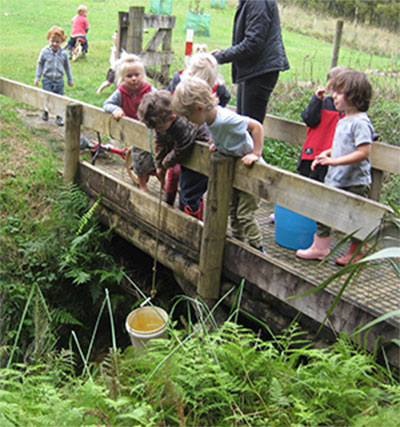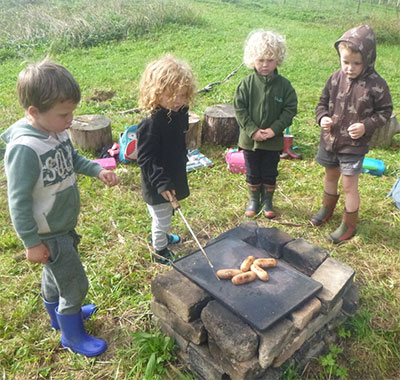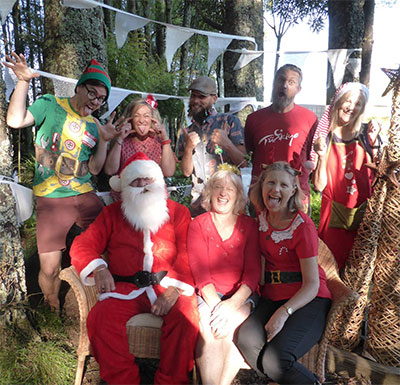decades of teacher experience combined
Our Programme

Our centre's programme is based on “Negotiated Curriculum”, which is a curriculum organised in response to the knowledge, interests, skills and dispositions of all the members of our centre community. The direction of learning is negotiated as each activity progresses. The teachers may make guesses as to where a topic will lead and prepare material accordingly, but they stay flexible so that enthusiasm and interest remains high. Children are encouraged to learn about the world and how it works through active exploration and interaction with others.
We implement the Principles and Aims of Te Whaariki throughout our curriculum. Our programme therefore reflects the holistic way children learn and the reciprocal relationships between the child, people and the learning environment. We involve parents, whaanau and the wider community as we endeavour to empower children to develop into capable and competent learners.
The staff will include Māori language and beliefs in meaningful ways in the programme to uphold the principles and the spirit of the Treaty of Waitangi.
The daily programme provides a wide variety of activities and experiences including:

- Indoor/outdoor
- Quiet/active
- Independent/co-operative
- Individual/small group/large group
- Child/adult initiated
- Involve small/large muscle movement
- Spontaneous/pre-planned
Activities offered include:
- Books, magnetic stories, story telling and puppets
- Dramatic, imaginative and family play
- Manipulative (e.g. puzzles, sorting/matching games, patterning)
- Block play and construction activities
- Science, nature exploration including bush walks and pond visits.
- Cooking, playdough
- Carpentry
- Art e.g. painting, clay, collage, box construction, weaving, finger painting print making, drawing, sewing, harakeke, pottery (making and firing).
- Music and movement, singing, rhymes, stick games, dance, playing instruments
- Water play
- Sand play, messy play
- Physically active play e.g. climbing, sliding, swinging, balancing, pushing, pulling, running, ball games and group activities.
- Adventuring, walks, outings.
putting the child at the centre of everything
Our Philosophy

We offer a warm welcome to all who pass through our door, just as we offer open hearts to each and every child.
We believe a well planned environment is a teacher in itself and should create an invitation for children to become involved. There is an emphasis on beauty, natural and recycled materials and easily available items for self-initiated play, physically active play, and exploration. We are enthusiastic about providing a wide range of creative experiences, emcompassing visual arts, drama, and music. We believe these areas are very valuable in contributing to the holistic development of children (cognitive, social, emotional, physical). We support children in contributing meaningfully to the physical environment as we believe that in doing so their sense of belonging and overall well-being is nurtured.
We believe that having animals in our environment gives children the opportunity to study and take responsibility for their care, to learn about the environment and to learn about animal needs and appropriate care. This contributes to children’s personal development, establishing caring attitudes and an introduction to a potential life-long interest involving animals.
We think of our centre as a learning community constructed through the everyday responsive and reciprocal relationships that develop between those that belong to it; children, whaanau, teachers and the wider community.
We believe that when children are given ample opportunity to love and connect with nature, they are motivated to care for, and develop respect for, our natural world and all living things. We have developed the ‘Uru Taiao’ programme (meaning ‘entering into the realms of nature’), to support our belief that “nature is as important to children as food and sleep, and through the exploration of nature children find freedom and genuine creativity.” By giving children extended periods of time in the outdoor environment we are empowering them to take control of their own social and emotional competency. We believe their vision of themselves as explorers and adventurers grows, and that when children are faced with the challenges in Uru Taiao; things like the inclement weather; assessing and taking risks; using logs and ropes for crossing spaces; finding their way through or over mud and puddles; making sure they are not hungry, thirsty, cold or hot, lonely or afraid; creating shelter; asking for help; building friendships, and having fun; we help build resilient, socially competent children. We believe they will meet new challenges with confidence and with consideration and support for those who are adventuring alongside them and that the environment we provide, the expectations we have, and our teaching practices are supporting children to grow up as competent and confident learners and communicators, healthy in mind, body, and spirit, secure in their sense of belonging and in the knowledge that they make a valued contribution to society.

The teacher is both a partner in learning and a facilitator in the process. By providing interesting experiences and engaging materials, the teacher invites the child to explore then steps back and follows the child’s lead.
There will be set routines during the day so that children’s physical needs are met. Children will be made aware of these routines (to increase their feelings of belonging and make them feel secure).
We are committed to developing a deeper understanding of Te Ao Māori so this can be passed on to the children and incorporated into our daily practice.
We will provide an environment that:
- Reflects the values and customs of all children who attend.
- Develops the emotional, physical, spiritual, social, intellectual and cultural well-being of each child at the level appropriate to them.
- Promotes a peaceful (non-violent) programme allowing for assertion, negotiation and mediation.
The programme provides tools for resolving conflict and increasing children’s emotional intelligence and builds a foundation for open, respectful communication.
